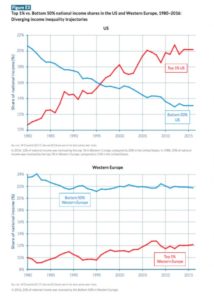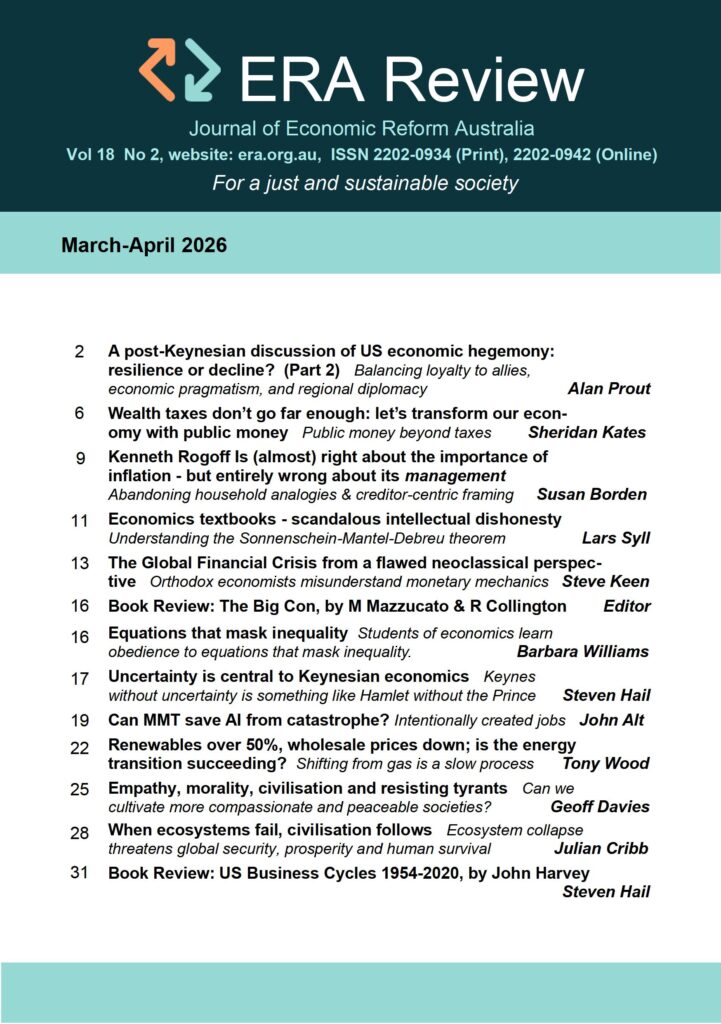Capitalist utopia has become a dystopia – Editor
American elites have ruined their society in a way the world hasn’t seen since Weimar Germany

In a previous issue of ERA Review we presented (v10, n4, p6) graphs displaying income inequality for the U.S. and France. The contrast between the two economies is indeed stark, however it’s important to recognise that the contrast is not confined to France. In figures 1 and 2 we show the percentage national income shares of the top 1% and the bottom 50% for the populations of the U.S. and Western Europe as a whole. This data was extracted from a recent article by Umair Haque [1] which has discussed the failure of U.S. capitalism to provide prosperity for the overwhelming majority of that country’s citizens. According to the author:
[these two charts display] American collapse in four lines. They say that American elites mismanaged their economy so badly, so fatally, so totally, that the rich world hasn’t seen the like since Weimar Germany. They created a capitalist utopia [for the wealthy] – but the problem is that it’s everyone else’s dystopia.
“To understand the story of this gargantuan, historic failure – not managing a society in any way resembling “well”, or even “sanely” – it’s probably best to understand what Europe did right – and then come back to what America did wrong. Which is that it embarked on  one of history’s greatest fools’ quests since alchemy, a utopian mission to turn the lead of capitalism into the gold of prosperity for everyone. But lead doesn’t turn into gold.
one of history’s greatest fools’ quests since alchemy, a utopian mission to turn the lead of capitalism into the gold of prosperity for everyone. But lead doesn’t turn into gold.
Why didn’t Europe’s “labour share of income” – that is, how much regular people receive – decline, like in the States? The simple answer, of course, is “more social democracy, and less capitalism”. But what does that mean? It means that European structures and institutions are radically different from American ones – so different, that many Americans have little idea such things even exist.
Both sides of American economics had devolved into something analogous to alchemy. They were on a quest to turn lead into gold – that is, to turn a capitalist society into a prosperous one. The right advocated something like totalitarian capitalism, capitalism as the only force in society – and the left, something slightly less than totalitarian capitalism. Hence, not a single U.S. economist of renown, left or right, said something like: “Hey everyone! We should have a national health service! A French-style sectoral bargaining for everyone! And also a BBC! Those would employ people, raise incomes and reverse the big problem in the economy.” Don’t you think that’s strange?
Yet America’s elites never questioned themselves once. They never looked at the world. They were too busy mesmerized by the alchemists who were telling them fantastic tales of turning lead into gold. Of capitalism becoming a promised land of prosperity. It did – for a tiny handful of people, whom, today, are richer and more powerful than the kings of old. But for everyone else, America became a gruesome, bizarre dystopia. A land where children are sold bullet- proof backpacks because no one can rein in the gun lobby. Where people choose between chemotherapy and bankruptcy. Where billionaires plan to flee to Mars – but a single space ship could pay for a thousand teachers, or the drinkable water, healthcare, and income that millions don’t have.
Like all utopian dreams, America’s failed catastrophically. Not because it didn’t try hard enough at turning lead into gold. But because it did. Lead does not turn into gold. Capitalism, alone, does not turn into prosperity. It was a fools’ quest from the beginning. But there they still are, the wise men, wearing their suits, nodding their heads, stroking their chins, wagging their fingers – have they learned anything yet? ”

1. https://eand.co/how-capitalist-utopia- became-everyone-elses-dystopia-a25a 88713956
Umair Haque is Director of the London-based Havas Media Lab and heads the Bubblegeneration, a strategy lab that helps discover strategic innovation.
He studies the economics of the future: the impact that new technologies, management innovations, and shifting consumer preferences will exert tomorrow on the industries and markets of today.































